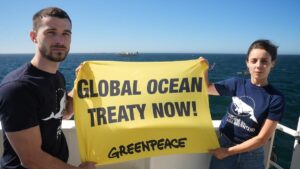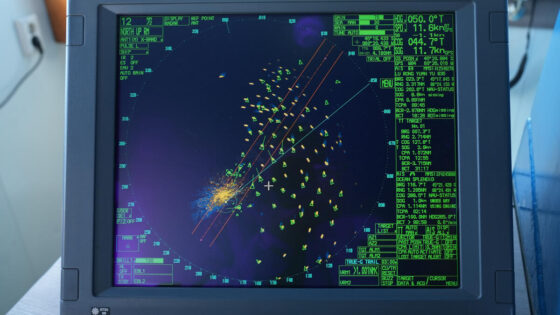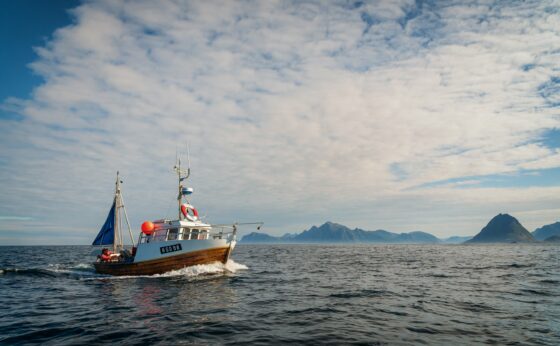
Armada of fishing vessels in South Atlantic as UN ocean treaty negotiations fail

As the fourth round of negotiations towards a Global Ocean Treaty fail to reach an agreement at the UN Headquarters in New York, the Greenpeace ship Arctic Sunrise has encountered a vast fleet of over 400 vessels fishing in the South Atlantic.
While returning from its recent expedition in the Antarctic, the crew discovered 265 vessels in their immediate vicinity (35 km), with the vessel’s radar (SAR) displaying what appeared to be a fishing free-for-all.

Image courtesy of Esteban Medina San Martin / Greenpeace
“This area is known as the wild west of the seas for a reason: it’s lawless and bloody out here,” says Luisina Vueso, oceans campaign lead from Greenpeace Andino, speaking from the Arctic Sunrise.
“Looking out from on deck I can see countless industrial fishing vessels on the horizon. We calculate 265 ships just within a 35 km range of us, and well over 400 in the broader ‘Blue Hole’ fishing area. These aren’t small vessels we’re talking about, this sea is spattered with huge industrial boats hauling life out of the ocean – and there’s barely any scrutiny.”
Governments at the UN have just failed to agree on a Global Ocean Treaty, which — it had been hoped — would pave the way to the protection of international waters by putting areas off-limits to destructive fishing. Talks collapsed last Friday without any agreement, and with no schedule set for further negotiations. Observers have urged political leaders to work with the UN to organise more talks before the end of this year.
“For the last two weeks, governments meeting at the UN to negotiate a Global Ocean Treaty have been talking, talking, talking – but out here it’s only action. Grim, ruthless, action that’s plundering the ocean for profit, pushing wildlife populations towards collapse and threatening the health of the biggest ecosystem on Earth. It’s a terrible sight to see,” adds Vueso.

There is currently no treaty that protects international waters, despite two decades of discussion
“Government promises to protect at least a third of the world’s oceans by 2030 are already coming off the rails,” says Will McCallum, of Greenpeace’s Protect the Oceans campaign, who was at the negotiations in New York. “It’s clear our oceans are in crisis, and if we don’t land the strong Global Ocean Treaty we need in 2022, there’s no way to create ocean sanctuaries in international waters to allow them to achieve that 30×30 goal.
“The glacial pace of negotiations at the UN over the past two weeks and the lack of agreement on a number of key issues just doesn’t reflect the urgency of the situation. Climate breakdown is transforming our oceans. Wildlife populations are declining. And as industrial fishing empties the seas of life, coastal communities around the world are seeing their livelihoods and food security threatened. These aren’t hypotheticals, our oceans are in crisis right now and in dire need of a rescue plan.
“Many countries are stepping up their efforts, but governments like the 48 members of the High Ambition Coalition, which have committed to securing a Global Ocean Treaty that delivers 30×30, need to escalate this immediately.”
While an array of international agreements and bodies overlap to manage resources in areas that are beyond national jurisdiction, there is currently no treaty that protects international waters, despite over two decades of discussion.
